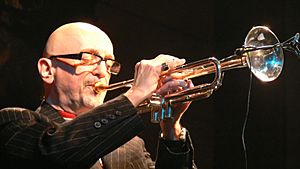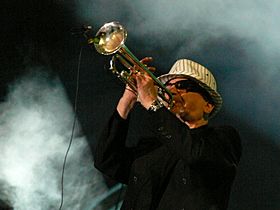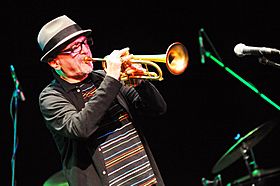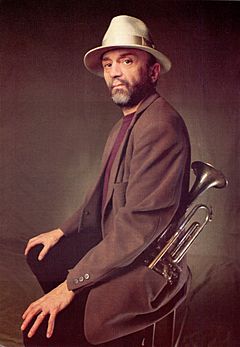Tomasz Stańko facts for kids
Quick facts for kids
Tomasz Stańko
|
|
|---|---|

Stańko in 2007
|
|
| Background information | |
| Birth name | Tomasz Ludwik Stańko |
| Born | 11 July 1942 Rzeszów, Poland |
| Died | 29 July 2018 (aged 76) Warsaw, Poland |
| Genres | Jazz |
| Occupation(s) | Musician |
| Instruments | Trumpet |
| Years active | 1960s–2018 |
| Labels | ECM, PolJazz, PN Muza |
| Associated acts | Krzysztof Komeda |
Tomasz Ludwik Stańko (born July 11, 1942 – died July 29, 2018) was a famous Polish trumpet player and composer. He was known for his unique style of jazz music, especially free jazz and avant-garde jazz. This means his music was often very creative and experimental.
In 1962, Tomasz Stańko started his first band called the Jazz Darings. They played a new style of jazz inspired by artists like Ornette Coleman and Miles Davis. Many music experts say this group was the first in Europe to play free jazz. Later, he worked with pianist Krzysztof Komeda on his important album Astigmatic in 1965. Stańko became a very important figure in both Polish jazz and the international jazz scene. He played with many famous musicians from around the world.
Contents
Life and Music Journey
Early Years and First Bands
Tomasz Stańko was born in Rzeszów, Poland, on July 11, 1942. He first discovered jazz music by listening to radio shows and seeing concerts from the U.S. State Department. Poland was under Communist rule at the time, and jazz music felt like a symbol of freedom to him. In 1958, he saw his first live jazz concert by Dave Brubeck.
In 1963, Stańko joined the Krzysztof Komeda quintet. Here, he learned a lot about how music is put together. He toured and recorded many albums with Komeda until 1967. In 1968, Stańko formed his own quintet, which became very popular. He also joined the Globe Unity Orchestra in 1970 and worked with other artists like Krzysztof Penderecki. He formed a quartet with saxophonist Tomasz Szukalski and Finnish drummer Edward Vesala, and their performances are considered very important.
Music in the 1980s and 1990s
During the 1980s, Tomasz Stańko traveled to India and even recorded music by himself inside the Taj Mahal. He also worked with other jazz stars like Chico Freeman. In the mid-1980s, he started working a lot with Cecil Taylor's big band.
In 1993, Stańko created a new quartet with young Polish musicians: drummer Michał Miśkiewicz (who was only 16!), pianist Marcin Wasilewski, and bassist Sławomir Kurkiewicz. This group became very successful. That same year, he also formed an international quartet with musicians like Bobo Stenson. In 1994, this quartet released their first album with ECM Records called Matka Joanna. In 1997, Stańko formed a group to play the music of his old friend, Krzysztof Komeda. They toured in Europe and played at big jazz festivals.
Stańko faced a challenge in the 1990s when he lost his natural teeth. But he worked hard with a dentist and practiced a lot to develop a new way of playing the trumpet, even with false teeth. This showed his dedication to music.
Music in the 2000s

The early 2000s were a busy time for Stańko, with many international tours. His Polish quartet released a second album called Suspended Night. Billboard magazine even said it was one of the best-selling jazz albums in the United States in 2004. ECM Records also released a collection of his best recordings.
In 2005, the quartet recorded their last album together, Lontano. All their albums were celebrated across Europe and the United States. In 2005, the band also toured Asia and Australia for the first time. Stańko also created music for the Warsaw Uprising Museum called Freedom in August.
Later in the 2000s, Stańko started new experiments and looked for new sounds. In 2007, he formed a new band, a Scandinavian quintet, and they recorded the album Dark Eyes in 2009.
Later Years and Legacy
The early 2010s marked a new chapter for Stańko as he moved to Manhattan, New York. He played regularly in famous New York jazz clubs like Birdland. This gave him the chance to meet and play with many local musicians, which brought new ideas to his music. He started new projects with artists like Lee Konitz and Chris Potter. Eventually, his New York Quartet was formed in 2012.
Stańko's life story, called Desperado, was published in Poland in 2010. In 2011, the Smithsonian Institution, a very large museum and research center in the United States, included one of his songs, "Suspended Night Variation VIII," in their six-disc jazz collection, Jazz: The Smithsonian Anthology. This shows how important his music was.
In his later years, Stańko also started a new project inspired by poetry. He played his trumpet alongside the famous Polish poet Wisława Szymborska during her poetry readings. This meeting inspired new songs and album titles for him. He dedicated his 2013 album Wisława to her.
In 2014, Stańko was asked to compose music for the opening of the POLIN Museum of the History of Polish Jews. This music was released as the album POLIN. His last studio album, December Avenue, came out in 2017. A jazz critic from The Guardian newspaper praised his unique trumpet sound, calling it "unique in jazz."
Tomasz Stańko received many awards for his music. In 2014, he received the "Polityka Passport" for his cultural leadership and the European Music Award of the Year in Paris. He also received an honorary award from German music journalists.
Stańko was also the director of the Jazzowa Jesień festival in Poland. Sadly, Tomasz Stańko passed away on July 29, 2018, in Warsaw, due to lung cancer. The day after he died, ECM Records shared a video tribute to him. Fellow musician Dave Holland described him as "a unique musician with deep feelings and a gentle soul."
What People Said About His Music
Many critics praised Tomasz Stańko's music. Derek Richardson from the San Francisco Chronicle said that Stańko was great at mixing beautiful melodies with free improvisation, calling him "one of the most eloquent" musicians. Author Brian Morton compared Stańko's melodic style to that of jazz legend Miles Davis.
Music Albums
As a Leader
| Year | Title | Label |
|---|---|---|
| 1974 | Fish Face | Poljazz |
| 1975 | TWET with Tomasz Szukalski, Edward Vesala, Peter Warren | PN Muza |
| 1975 | Tomasz Stańko & Adam Makowicz Unit (pl) with Adam Makowicz and Czesław Bartkowski |
JG Records |
| 1976 | Unit (pl) with Adam Makowicz, Paweł Jarzębski and Czesław Bartkowski |
PSJ |
| 1976 | Balladyna | ECM |
| 1976 | Live at Remont with Edward Vesala Quartet | Helicon |
| 1979 | Almost Green | Leo Records |
| 1980 | Music from Taj Mahal and Karla Caves | Leo Records |
| 1983 | Stańko (W Pałacu Prymasowskim) ("At the Primate's Palace") |
Poljazz |
| 1984 | Music 81 | PN Muza |
| 1985 | A i J | Poljazz |
| 1985 | C.O.C.X. | Pronit |
| 1986 | Korozje with Andrzej Kurylewicz | Poljazz |
| 1986 | Lady Go... | PN Muza |
| 1988 | Witkacy Peyotl / Freelectronic | Poljazz |
| 1988 | The Montreux Performance a.k.a. Switzerland Tomasz Stańko Freelectronic |
PN Muza / ITM Germany |
| 1989 | Chameleon | Utopia |
| 1989 | Polish Jazz Vol. 8 (compilation of PN Muza releases) | PN Muza |
| 1991 | Tales for a Girl, 12, and a Shaky Chica | JAM |
| 1992 | Bluish | Power Bros |
| 1993 | Bosonossa and Other Ballads | GOWI |
| 1994 | Balladyna – Theatre Play Compositions | GOWI |
| 1996 | Roberto Zucco | Polonia |
| 1997 | Leosia | ECM |
| 1999 | From the Green Hill | ECM |
| 2004 | Selected Recordings - Rarum XVII | ECM |
| 2005 | Wolność w sierpniu ("Freedom in August") | FIRe |
| 2008 | Freelectronic in Montreux | NewEdition |
| 2014 | Polin | Polin |
Tomasz Stańko Quintet Albums
| Title | Album details | Peak chart positions | Sales | Certifications | |||||||||||||||
|---|---|---|---|---|---|---|---|---|---|---|---|---|---|---|---|---|---|---|---|
| POL |
US Jazz |
||||||||||||||||||
| Music For K |
|
— | — | ||||||||||||||||
| Jazzmessage from Poland |
|
— | — | ||||||||||||||||
| Purple Sun |
|
— | — | ||||||||||||||||
| Dark Eyes |
|
5 | 16 |
|
|
||||||||||||||
| "—" means the album did not chart or was not released in that country. | |||||||||||||||||||
Tomasz Stańko Quartet Albums
| Title | Album details | Peak chart positions | Sales | Certifications | |||||||||||||||
|---|---|---|---|---|---|---|---|---|---|---|---|---|---|---|---|---|---|---|---|
| POL |
US Top Jazz |
||||||||||||||||||
| Matka Joanna |
|
— | — | ||||||||||||||||
| Soul of Things |
|
20 | — |
|
|
||||||||||||||
| Suspended Night |
|
10 | 20 |
|
|
||||||||||||||
| Lontano |
|
16 | 14 |
|
|
||||||||||||||
| "—" means the album did not chart or was not released in that country. | |||||||||||||||||||
Tomasz Stańko New York Quartet Albums
| Title | Album details | Peak chart positions | |||||||||||||||||
|---|---|---|---|---|---|---|---|---|---|---|---|---|---|---|---|---|---|---|---|
| POL |
|||||||||||||||||||
| Wisława |
|
10 | |||||||||||||||||
| December Avenue |
|
- | |||||||||||||||||
| "—" means the album did not chart or was not released in that country. | |||||||||||||||||||
Tomasz Stańko Septet Albums
| Title | Album details | Sales | Certifications |
|---|---|---|---|
| Litania: Music of Krzysztof Komeda |
|
|
|
Video Albums
| Title | Video details | Notes |
|---|---|---|
| Sounds Like Christmas |
|
|
Soundtracks
| Title | Album details |
|---|---|
| A Farewell to Maria |
|
| Reich |
|
| Egzekutor |
|
| Homeland Netflix series music of end 4th season |
Guest Appearances
| Album | Year |
|---|---|
| Krzysztof Komeda – Astigmatic | 1966 |
| Globe Unity Orchestra – Globe Unity 67 & 70 | 1970 |
| Dżamble – Wołanie O Słońce Nad Światem | 1971 |
| Piotr Figiel – Piotr | |
| Tadeusz Prejzner – Spacer Brzegiem Morza | 1972 |
| Maryla Rodowicz – Wyznanie | |
| Novi Singers – Rien Ne Va Plus | 1973 |
| Jan "Ptaszyn" Wróblewski – Sprzedawcy Glonów | |
| Edward Vesala – Satu | 1977 |
| Edward Vesala – Heavylife | 1980 |
| Gary Peacock – Voice from the Past – Paradigm | 1981 |
| Graham Collier – Hoarded Dreams | 1983 |
| Cecil Taylor – Winged Serpent (Sliding Quadrants) | 1985 |
| Nicolas Simion – Dinner for Don Carlos | 1991 |
| Leszek Możdżer – Chopin – Impresje | 1994 |
| Mark O'Leary and Billy Hart – Levitation | 2005 |
Books About Tomasz Stańko
- Stanko, Tomasz (2010). Desperado!. Krakow: Wydawnictwo Literackie. ISBN 978-8308053263.
 | Audre Lorde |
 | John Berry Meachum |
 | Ferdinand Lee Barnett |



